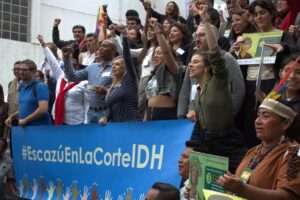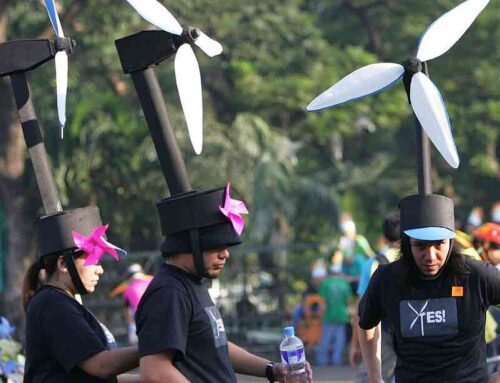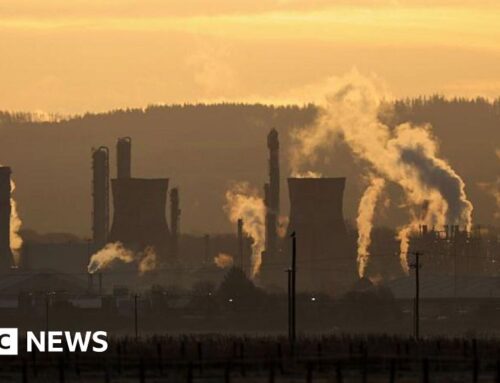An Unprecedented Opportunity: The Forum for Environmental Defenders in the Caribbean – Cen
April 7, 2025
Published on April 7, 2025
By Luisa Gomez Betancur, Senior Attorney at the Center for International Environmental Law, and Alexandra Cólon-Amil, Communications Campaign Specialist at the Center for International Environmental Law.
Latin America and the Caribbean is the most violent region in the world for those who defend the land and the environment. Brazil, Colombia, Honduras, and Mexico account for 85% of the documented murders of environmental defenders. In this context, governments in the region, civil society organizations, and defenders have worked for decades to materialize the Escazú Agreement — the first binding regional treaty that promotes environmental democracy and the only one in the world that includes basic guarantees for those defending the environment. A new milestone in this process will be the Third Forum on Human Rights Defenders in Environmental Matters from April 7 to 10 in Saint Kitts and Nevis, where key measures will be taken to protect the rights and work of environmental defenders. This Forum will be especially significant because it is the first time it is held in the insular Caribbean, one of the regions that suffers and will disproportionately suffer the effects of the climate crisis, which intensifies the pressure on the environment and those who risk their lives to defend it.
What are the Environmental Defenders Forums?
Within the framework of the Escazú Agreement, important decisions have been made to protect and promote the work of environmental defenders. In 2024, the Third COP of Escazú — the conference that brings together the parties to the Agreement — approved the Action Plan on Human Rights Defenders in Environmental Matters, a regional instrument aimed at implementing strategic actions to ensure the safety of environmental defenders, taking measures to recognize and protect their rights, as well as preventing, investigating, and sanctioning attacks or threats against them.
The Environmental Defenders Forums have been established for the creation, implementation, and monitoring of this Plan. They function as regional platforms for participation and public discussion to expose the challenges faced by environmental defenders and explore routes and proposals to address these issues.
What to Expect from the 3rd Environmental Defenders Forum?
One of the main objectives of this Forum in Saint Kitts and Nevis is to define the actions that the member states and other key actors should take to implement the Escazú Agreement’s Action Plan on Defenders. In coalition with civil society organizations in Latin America and the Caribbean, the Center for International Environmental Law (CIEL) has provided strategic recommendations to the states to strengthen these actions. Among others, we highlighted:
- The importance of indicators to evaluate the implementation and impact of the Action Plan;
- The urgency of building a regional diagnosis on the situation of environmental defenders with a participatory methodology that includes recommendations; and
- The need to engage policymakers, judicial actors, and others responsible for ensuring the rights of defenders in preventing, responding, and sanctioning reprisals against them.
The Focus on the Caribbean
Currently, there are dozens of documented socio-environmental conflicts in the insular Caribbean involving a variety of industries — from hydrocarbon extraction and mineral mining to infrastructure development and tourism. However, there is little information on the situation of environmental defenders and their work in this region’s socio-environmental context, which contributes to the false perception that “nothing happens in the Caribbean.”
In more than a decade, authoritative reports in this field have recorded three lethal attacks on environmental defenders in a single Caribbean country. As the reports themselves acknowledge, these figures are “partial reflections” of the violence against environmental defenders. There are structural challenges preventing comprehensive documentation and detection of specific cases, such as the limited presence of civil society organizations in specific areas, media repression, or widespread violence and insecurity. Moreover, attention tends to focus on lethal attacks, overshadowing severe aggressions such as forced disappearance, criminalization, harassment, and stigmatization.
The Third Environmental Defenders Forum offers a unique opportunity to shine a light on the multiple risks faced by environmental defenders in the Caribbean, whose work and safety are increasingly indispensable as the climate emergency worsens.

Escazú and Climate Justice
In the year 2000, according to the Global Atlas of Environmental Justice, there were nearly a thousand reported socio-environmental conflicts worldwide. Today, this number has increased by almost 400%. As climate impacts become more frequent and intense, pressure on territories and resources will also intensify. This situation will likely exacerbate socio-environmental conflicts, thereby increasing the vulnerabilities of those who defend the environment. In this context, it is essential to strengthen the rights and work of environmental defenders, and for this, the Escazú Agreement and its Action Plan are key. Alongside civil society organizations, CIEL participated in the Advisory Opinion process of the Inter-American Court of Human Rights on the Climate Emergency, advocating for the inclusion of the Escazú Agreement’s standards as basic legal guarantees when specifying the obligation of States to protect the work of environmental defenders, as well as the rights to information, participation, and environmental justice.
During this Third Forum, CIEL, together with other organizations, has convened the event #EscazúEnLaCorteIDH to share how we have conceived this advocacy strategy, the progress made, and our expectations regarding the Court’s Opinion. We will be providing updates about this event and key moments of the Forum in Saint Kitts and Nevis on our social media. Follow us here:
Este blog se encuentra disponible en Español aquí.
About CIEL’s People, Land, and Resources Program
CIEL’s People, Land & Resources Program (PLR) seeks to protect and defend the environment and human rights against the adverse impacts of development. We work at all levels – from international to grassroots – to ensure that the laws and policies governing development activities are consistent with those protecting the environment and human rights, and to hold governments and corporations accountable for their actions.
Search
RECENT PRESS RELEASES
Related Post




